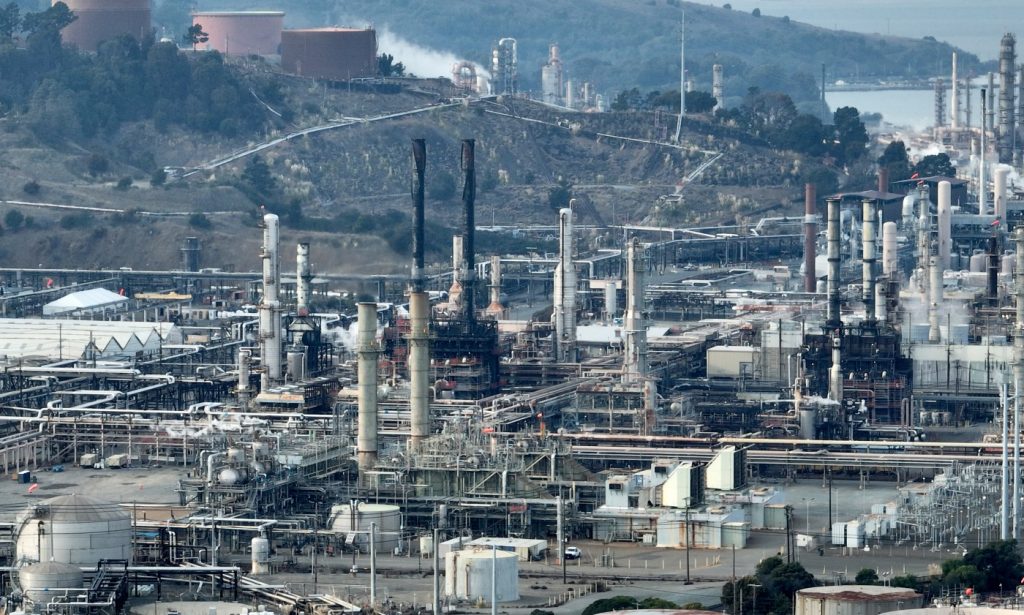For millennia, farmers throughout the world have stored excess grains during harvest season to ensure there’s enough food year-round. Likewise, for more than a century, California has stored water in winter so we don’t run out during the dry summer months.
But there’s one major commodity that California has never required to be maintained in adequate supply, even though it remains essential to our economy: gasoline.
Because we have no gasoline reserves, California routinely suffers fuel shortages, especially during peak travel times, such as Labor Day or Thanksgiving or when one or more of our major oil refineries shuts down for maintenance.
These fuel shortages, in turn, cause price hikes at the pump. Sometimes prices can spike 50 cents a gallon or more in a very short period, burdening our already stretched household budgets.
That’s why the Legislature should pass Gov. Gavin Newsom’s commonsense proposal to require oil refineries to maintain sufficient reserves of gasoline so that California can avoid future shortages and the price spikes they cause. The proposal, AB X 2-1, is now in the state Assembly during a special legislative session.
Opponents, including major oil refiners, are claiming that the bill will lead to higher gas prices.
But experts and the state agency that analyzed the need for sufficient gasoline supplies estimate that if there is a cost, it will be just a few cents per gallon because California refineries already have the capacity to maintain sufficient supplies.
There’s also no evidence that maintaining adequate supplies for other commodities causes price to go up. It’s certainly not true of the U.S. Strategic Petroleum Reserve, which is similar in concept to what the governor’s proposal would mandate. In fact, the U.S. petroleum reserve has proven repeatedly to stabilize prices and protect our national economy from price shocks caused by shortages.
That’s why Australia, Japan and the European Union all now have petroleum reserves as well.
Oil companies, of course, have a major incentive to oppose AB X 2-1. Research shows that oil companies pocket huge profits when gas prices spike. So for them, there’s no reason to support a proposal that would curb price hikes at the pump.
The bill is follow-up legislation to a groundbreaking law that I partnered with Gov. Newsom on last year: SB X 1-2, creating the nation’s first anti-gas-price-gouging measure. Not only has that law helped stabilize gas prices, it required oil refiners to open their books to the Division of Petroleum Market Oversight (DPMO), an independent division within the California Energy Commission (CEC) established by SB X 1-2 to fully examine the state’s gasoline market.
The CEC has concluded that gasoline prices spikes caused by fuel shortages have cost Californians hundreds of millions of dollars at the pump in the past year alone.
Related Articles
Gov. Newsom signs new laws cracking down on oil industry in California
Gov. Newsom’s gas price proposal debated at special session legislative hearings
Inflation starts to ease in Bay Area — finally — after years of painful prices
Gov. Newsom calls lawmakers into special session to address high gas prices
Pack your patience: Bay Area Labor Day travel expected to shatter records
The DPMO recommended giving the CEC the authority to require oil refiners to maintain adequate fuel supplies so that the state no longer experiences shortages during planned refinery shutdowns. And it recommended that the CEC have the ability to ensure that oil refineries are adequately prepared for planned shutdowns for maintenance. The governor put both of those pragmatic recommendations in his latest proposal.
To be sure, over the next few decades, California will fully transition away from fossil fuels as we combat climate change. But until then, gasoline will continue to be a major driver of our economy.
Maintaining adequate supplies of commodities to guard against future uncertainty is an age-old tradition. It has worked in agriculture, with water and for oil. It will work for gasoline, as well.
State Sen. Nancy Skinner, D-Berkeley, represents the 9th District, which includes Richmond and Rodeo, home to two of California’s largest oil refineries.


